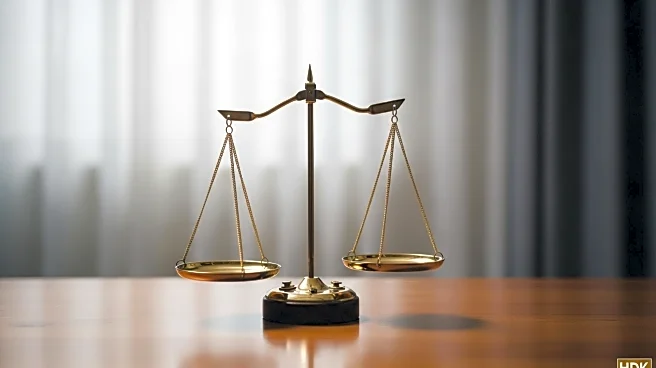What is the story about?
What's Happening?
A federal appeals court has determined that President Trump exceeded his authority by imposing extensive tariffs on numerous countries, citing misuse of emergency powers. The U.S. Court of Appeals for the Federal Circuit upheld a previous decision by a specialized federal trade court, stating that the International Emergency Economic Powers Act (IEEPA) does not grant the President unlimited tariff authority. Despite the ruling, the tariffs remain in effect temporarily, allowing the administration time to appeal to the Supreme Court. President Trump has expressed his intention to challenge the decision, arguing that overturning the tariffs would harm the U.S. economy. The ruling has sparked debate over the President's use of emergency powers and its impact on American businesses and consumers.
Why It's Important?
The court's decision is significant as it challenges the scope of presidential authority under emergency powers, particularly in trade policy. The ruling could have substantial implications for U.S. businesses and consumers, potentially leading to lower prices and increased market stability if the tariffs are ultimately removed. It also highlights the ongoing tension between executive power and legislative authority in regulating trade. The decision may prompt Congress to reassess its role in trade policy, potentially reclaiming some of the powers delegated to the President. The outcome of this legal battle could influence future administrations' approach to trade and economic policy.
What's Next?
The Trump administration plans to appeal the ruling to the Supreme Court, seeking to maintain the tariffs. If the appeal fails, the government may face financial repercussions, including refunding collected tariffs, which could impact the U.S. Treasury. The decision may also lead to legislative efforts to limit presidential tariff authority, as indicated by Democratic Sen. Ron Wyden's intention to push for votes on repealing the tariffs. Businesses and trade organizations are closely monitoring the situation, anticipating potential changes in trade policy and economic conditions.
Beyond the Headlines
The ruling raises questions about the balance of power between the executive and legislative branches in trade policy. It underscores the need for clear legal frameworks governing the use of emergency powers, particularly in economic matters. The case may set a precedent for future challenges to presidential authority, influencing how emergency powers are interpreted and applied. Additionally, the decision could affect international relations, as tariffs have been used as leverage in trade negotiations with other countries.

















